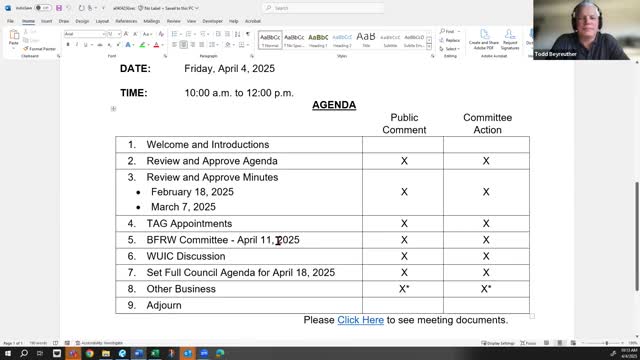Committee debates process for EV-charging petitions and embodied-carbon proposal ahead of April hearings
Get AI-powered insights, summaries, and transcripts
Subscribe
Summary
Executive committee members and stakeholders debated whether to consolidate, deny or modify three competing EV-charging petitions and discussed procedural and economic gaps in an embodied-carbon proposal ahead of upcoming BFRW/B RFW committee hearings.
Committee members spent substantial time discussing process options for three competing petitions to amend the code’s EV charging and readiness provisions, and they raised procedural cautions about how to proceed with an embodied-carbon proposal that several stakeholders say lacks an updated economic-impact analysis.
Roger Haringa, committee chair, and Todd (staff) explained the committee’s options for the EV proposals: deny all three and introduce a new alternate; pick one petition and modify it while denying the others; or modify one or more and forward them. Haringa said the petitions are “very similar” and that the committee’s work will likely focus on adjusting numeric thresholds for EV-ready and EV-capable requirements before recommending a preferred approach to the full council.
Jay Arnold urged caution, suggesting the committee could post multiple options for public comment and make a final choice at adoption. Todd summarized that the council had forwarded all three petitions to the committee for further work and reminded members they must follow RCW and council rulemaking processes when filing amended proposals.
Patrick Hanks, representing the Building Industry Association of Washington and a proponent in prior hearings, said he still disagreed with the TAG summary of intent and urged careful consideration of broader code-section rework beyond percentage tweaks. He also highlighted a concern raised by stakeholders that the embodied-carbon proposal’s economic-impact section had not been completed or updated; he said that deficiency makes it harder for stakeholders, particularly small businesses, to assess cost implications.
Committee members directed staff and proponents to continue technical work and suggested posting revised language for review. Dustin (SBCC staff) said he would work with proponents to post any consolidated or revised language and recommended using the standard CR-102 code-change form for uniformity. No formal vote was taken; the discussion was procedural and intended to produce language for committee deliberation at the April 11 BFRW committee meeting.
The committee also discussed outreach and notice: Patrick and others urged clearer GovDelivery notices that highlight specific agenda topics (for example, embodied carbon) so affected stakeholders can find and comment on proposals in time for hearings. Staff agreed to coordinate a targeted notice and to include committee leadership in test sends.
